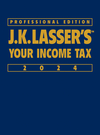Greater Opportunities to Save for Retirement
After paying bills, it's hard for most people to find money to set aside for retirement. Fortunately, the tax law can help you save for the future. The tax law allows you to:
- Contribute to a company retirement plan, such as a 401(k) or 403(b) plan, on an after-tax basis (if your employer offers such a plan).
- Contribute to a personal IRA and, in many cases, deduct your contributions.
- Contribute to a Roth IRA, if eligible, to create tax-free retirement income.
- Claim a tax credit for making these contributions, if your income does not exceed set limits.
Flash: Each of these breaks has been improved for 2008.
401(k) contributions
Your employer may have a 401(k) plan, which is a type of retirement plan to which you can make pretax and/or after-tax contributions. The contribution limits for 2007 ($15,500, plus an additional $5,000 for those who attain age 50 by year end) are the same in 2008. There is no increase in the limit.
- What's new. Companies can adopt automatic enrollment into their 401(k) plans. Usually, if they do have this feature, your contributions are capped at 3% in the first year. You can opt out of contributing or choose to contribute a greater amount; follow instructions from your plan administrator.
- Best advice. It's wise to contribute at least as much as necessary in order to earn employer matching contributions. The plan administrator can explain this to you.
IRA contributions
The basic dollar limit on contributing to a regular or Roth IRA in 2008 is $5,000 (up from $4,000 in 2007). Those who are at least 50 years old by the end of the year can contribute an additional $1,000.
- Eligibility to make deductible IRA contributions. If you actively participate in a qualified retirement plan, such as your employer's 401(k), you can deduct your IRA contributions only if your modified adjusted gross income (MAGI) does not exceed set limits. Good news: For 2008, those limits just got higher, so even if you were barred from claiming a deduction in 2007, check your eligibility for 2008.
- Eligibility to make Roth IRA contributions. The MAGI limit on these contributions has also increased for 2008, so even if you could not contribute to a Roth IRA in 2007, you may be able to in 2008.
Tax credit for retirement savers
Adding money to a 401(k) or similar plan or to an IRA may entitle you to a tax credit of up to $1,000! Eligibility is easier in 2008 than it was in 2007 because you can earn more income and still qualify.
In-service distributions
If you are at least 62 years old, beginning in 2008 you can start to receive distributions from the company's retirement plan if you want to do so and your company allows it-even though you continue to work (that is, before you retire). In the past, "in-service" distributions were barred; now companies can amend their plans to allow them. Talk with your plan administrator if you need the funds and meet the age threshold.



